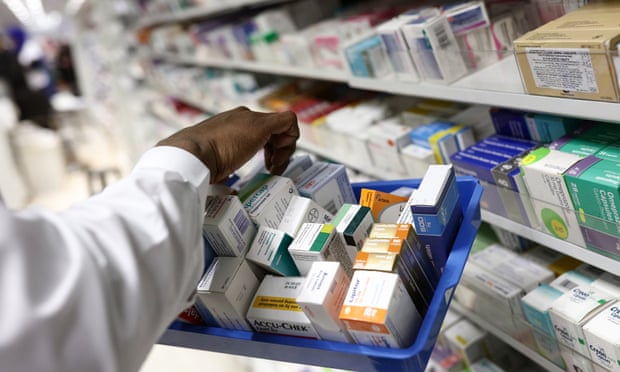Unpublished figures reveal a doubling of products in short supply over past two years
An unprecedented medicines shortage in the NHS is endangering lives, pharmacists have said, as unpublished figures reveal that the number of products in short supply has doubled in two years.
A treatment for controlling epileptic seizures was the latest to be added on Wednesday to a UK drugs shortage list that includes treatments for conditions ranging from cancer to schizophrenia and type 2 diabetes.
Causes of the crisis are thought to include the plummeting purchasing value of the pound since the Brexit referendum, which reduces the NHS’s ability to source medicines abroad, and a government policy of taxing manufacturers.
According to Department of Health and Social Care (DHSC) figures provided to the British Generic Manufacturers Association, there were 111 drugs on a shortages list on 30 October last year and 96 on 18 December, with supply notifications issued for a further 10 treatments to NHS providers in the UK since then.
It amounts to a 100% increase in shortages compared with January 2022, with pharmacists and health charities claiming the conditions of some patients were deteriorating as a result.
Delyth Morgan, the chief executive of Breast Cancer Now, said her organisation had been contacted over the past 12 months by several patients unable to source the medicines they needed to control the spread of their disease.
She said: “Last year many people shared with us, via Breast Cancer Now’s helpline, that they’d been facing difficulties accessing their hormone treatment including letrozole, anastrozole and tamoxifen, causing them huge worry and anxiety. Trying to track down a treatment by travelling to a number of different pharmacies is an added burden for patients at an already difficult time.
“It may also sometimes be that certain brands of drugs are out of stock and people may have to switch to another brand or different drug. In the worst case someone may have a period of time without the medication, a drug which could help reduce the risk of their breast cancer coming back or spreading.”
Douglas Twenefour, the head of care at Diabetes UK, said: “The ongoing shortages of many GLP-1 medications are having serious implications for many people with type 2 diabetes and are still a major concern. With these shortages likely to last for at least the rest of this year, this will have a significant impact on whether many people with type 2 diabetes can access the best course of treatment for them.”
There have been well-documented shortages in hormone replacement therapy and attention deficit hyperactivity disorder products due, in part, to higher demand.
Janet Morrison, the chief executive of Community Pharmacy England, said the shortages were unprecedented and were beginning to hit patients hard. “Pharmacy teams have been struggling to get hold of prescription medicines for many months but the problem is now worse than ever,” she said.
“It has become worryingly normal to see hundreds of medicines affected by pricing and other issues every month, with problems now a daily occurrence for pharmacies. Pharmacies are having to spend hours – on average an extra 11 hours a week – tracking down the medicines their patients need.
“This all causes worrying delays for patients, and in worst cases it can lead to a deterioration of their health: last year we surveyed people working in pharmacies and 87% told us that their patients’ health was being put at risk due to medicine supply issues. This is shocking, and government and the NHS must step in to resolve these issues.”
NHS medicines shortage putting lives at risk, pharmacists warn
1 post
• Page 1 of 1
 NHS medicines shortage putting lives at risk, pharmacists warn
NHS medicines shortage putting lives at risk, pharmacists warn
-

dutchman - Site Admin
- Posts: 50630
- Joined: Fri Oct 23, 2009 1:24 am
- Location: Spon End
1 post
• Page 1 of 1
Who is online
Users browsing this forum: No registered users and 2 guests
-
- Ads


